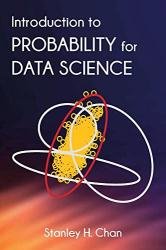Introduction to Probability for Data Science
- Добавил: literator
- Дата: 29-11-2021, 11:42
- Комментариев: 0
 Название: Introduction to Probability for Data Science
Название: Introduction to Probability for Data ScienceАвтор: Stanley H. Chan
Издательство: Michigan Publishing
Год: 2021
Страниц: 709
Язык: английский
Формат: pdf (true)
Размер: 16.5 MB
An undergraduate textbook on probability for Data Science.
This book is an introductory textbook in undergraduate probability. It has a mission: to spell out the motivation, intuition, and implication of the probabilistic tools we use in science and engineering. From over half a decade of teaching the course, I have distilled what I believe to be the core of probabilistic methods. I put the book in the context of Data Science to emphasize the inseparability between data (computing) and probability (theory) in our time.
Probability is one of the most interesting subjects in electrical engineering and Computer Science (CS). It bridges our favorite engineering principles to the practical reality, a world that is full of uncertainty. However, because probability is such a mature subject, the undergraduate textbooks alone might fill several rows of shelves in a library. When the literature is so rich, the challenge becomes how one can pierce through to the insight while diving into the details. For example, many of you have used a normal random variable before, but have you ever wondered where the “bell shape” comes from? Every probability class will teach you about flipping a coin, but how can “flipping a coin” ever be useful in machine learning today? Data scientists use the Poisson random variables to model the internet traffic, but where does the gorgeous Poisson equation come from? This book is designed to fill these gaps with knowledge that is essential to all Data Science students.
This leads to the three goals of the book. (i) Motivation: In the ocean of mathematical definitions, theorems, and equations, why should we spend our time on this particular topic but not another? (ii) Intuition: When going through the derivations, is there a geometric interpretation or physics beyond those equations? (iii) Implication: After we have learned a topic, what new problems can we solve?
The book’s intended audience is undergraduate juniors/seniors and first-year graduate students majoring in electrical engineering and computer science. The prerequisites are standard undergraduate linear algebra and calculus, except for the section about characteristic functions, where Fourier transforms are needed. An undergraduate course in signals and systems would suffice, even taken concurrently while studying this book.
Скачать Introduction to Probability for Data Science
Внимание
Уважаемый посетитель, Вы зашли на сайт как незарегистрированный пользователь.
Мы рекомендуем Вам зарегистрироваться либо войти на сайт под своим именем.
Уважаемый посетитель, Вы зашли на сайт как незарегистрированный пользователь.
Мы рекомендуем Вам зарегистрироваться либо войти на сайт под своим именем.
Информация
Посетители, находящиеся в группе Гости, не могут оставлять комментарии к данной публикации.
Посетители, находящиеся в группе Гости, не могут оставлять комментарии к данной публикации.
